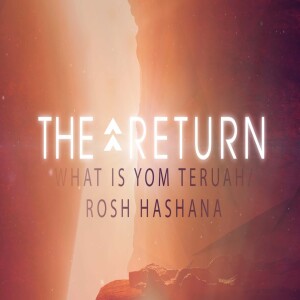

THE RETURN: What is Yom Teruah/Rosh Hashanah?
In this insightful Bible teaching from Founded in Truth Fellowship, Matthew Vander Els delves into the profound significance of Yom Teruah, also known as Rosh Hashanah. This annual observance, occurring on the first day of the seventh month of the Hebrew calendar, is far more than just a religious holiday; it's a pivotal moment centered on the theme of the Supreme King, the enthronement of God as King of Kings and Lord of Lords. The prayer service of Musaf on Rosh Hashanah day one emphasizes this, proclaiming God as the supreme king who remembers, judges, and reigns forever.
Yom Teruah, meaning "day of trumpets" or "blasting," is a day set apart for complete rest and a holy convocation, marked by the sounding of trumpets (shofar) and the presentation of offerings to the Lord. While the literal act involves blowing trumpets, the deeper meaning signifies something far more significant than mere noise. The purpose of understanding this day is to cultivate excitement for the feasts of the Lord and to approach these observances with a sense of weight and focused worship.
This day carries several significant names, each revealing a different facet of its importance:
- Yom Teruah (יוֹם תְּרוּעָה): The Day of Trumpets/Blasting. This name, found in Numbers 29:1, directly refers to the commanded act of blowing the shofar. The Hebrew word "teruah" signifies not just a loud noise, but also a joyful sound, a shout of rejoicing at the reception of a king, a war cry, or a trumpet blast announcing something significant.
- Rosh Hashanah (רֹאשׁ הַשָּׁנָה): The Head of the Year. This is the name by which Judaism primarily recognizes the holiday, signifying the beginning of the civil new year. While Exodus 12:2 establishes the spring month of Nisan as the beginning of the religious year, there's evidence suggesting a historical recognition of the fall, the seventh month, as the start of the year, possibly a civic or agricultural calendar.
- Yom Hazikaran (יוֹם הַזִּכָּרוֹן): The Day of Remembrance/Memorial. Leviticus 23:24 describes it as a "memorial of blowing of trumpets." This day is associated with God remembering His creation and potentially recalling the deeds of humanity.
- Yom Hadin (יוֹם הַדִּין): The Day of Judgment. Jewish tradition strongly links Rosh Hashanah with a day of divine judgment, a time when God reviews each person's life and status. The Musaf prayer speaks of God as the sole judge who knows, proves, remembers, and seals, opening the Book of Chronicles where everyone's signature is inscribed. Daniel 7 depicts a scene of divine judgment with books being opened.
- Yom HaKeseh (יוֹם הַכֶּסֶה): The Day of Concealment/The Day of the Throne. This name is derived from Psalm 81:3, which in some interpretations, connects the blowing of the trumpet at the new moon with a "concealed" time or the "throne." The new moon was traditionally declared based on eyewitness testimony, making the exact timing of the feast somewhat concealed until confirmed. The Hebrew word "keseh" can also refer to a throne, further emphasizing God's kingship.
- Hayom Hashem (הַיּוֹם הַשֵּׁם): The Day of the Lord. This name, found in prayer books, highlights the sacred and divinely appointed nature of the day.
The blowing of the shofar is central to Yom Teruah. It's not merely a random act but carries deep symbolic weight. The Jesenius Hebrew Chaldee lexicon defines "teruah" as a loud noise, joyful noise, rejoicing, often associated with the reception of a king. Psalm 47, traditionally read on Yom Teruah, calls for clapping hands and shouting to God with a voice of triumph, an enthronement psalm celebrating God's kingship. The act of clapping hands is biblically seen as a way of honoring royalty, as exemplified in the enthronement of King Joash in 2 Kings 11:12.
Application for Everyday Life- Focus on Repentance and Reflection: Yom Teruah, associated with judgment and remembrance, serves as a reminder to examine our lives, repent of our shortcomings, and seek reconciliation with God and others.
- Acknowledge God's Kingship: Recognize and actively acknowledge God's sovereignty in all aspects of your life. Like the blowing of the shofar proclaims a king, let your actions and words declare Jesus as Lord.
- Anticipate the Return of Christ: The themes of trumpet blasts and heavenly gatherings point towards the future return of Messiah. Live with a sense of joyful expectation and readiness.
- Engage in Joyful Worship: Like the shouts and clapping described in Psalm 47, approach God with enthusiastic praise and celebration.
- Value Tradition with Discernment: Understand the historical and cultural context of biblical feasts and traditions, recognizing their potential insights without elevating them above scripture.
For more Bible Teachings, click the link.
ReferencesBible Verses:
- Exodus 12:2
- Exodus 23:16
- Leviticus 23:24
- Numbers 29:1
- Psalm 47:1
- Psalm 81:3
- Daniel 7:9
- Matthew 24:30
- 1 Corinthians 15:52
- Revelation 4:1
Books and Resources Mentioned:
- Max Oros prayer book for Rosh Hashanah, Yom Teruah
- The Lost Key by Joseph Goode
- Anchor Yale Bible Dictionary
- The Mishnah, tractate Rosh Hashanah
Note: This article contains affiliate links.
More Episodes
All Episodes>>You may also like
Create Your Podcast In Minutes
- Full-featured podcast site
- Unlimited storage and bandwidth
- Comprehensive podcast stats
- Distribute to Apple Podcasts, Spotify, and more
- Make money with your podcast













